Solid Angle Cinema 4D to Arnold 4.6.1 (x64)
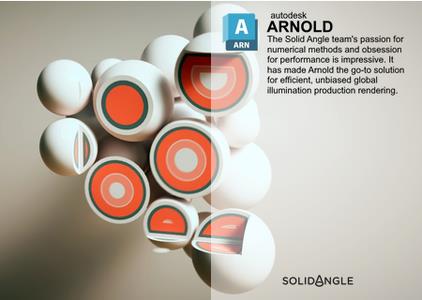
Free Download Solid Angle Cinema 4D to Arnold 4.6.1 | 5.4 Gb
The Team Solid Angle announced the launch of Arnold (C4DtoA) 4.6.1 for Cinema4D. This update uses Arnold 7.2.1.0 and is a major feature release bringing a new distance shader, faster and simpler light sampling, improved shape instancing, as well as many performance improvements and bug fixes.
Product:Solid Angle Cinema4D to Arnold
Version:4.6.1
Supported Architectures:x64
Website Home Page :www.arnoldrenderer.com
Languages Supported:english
System Requirements:Windows / macOs / Linux *
Size:5.4 Gb
4.6.1 - Date: 29 March 2023
Distance shader:A new distance shader that uses the distance to the nearest surface to interpolate between near and far color values. (ARNOLD-9361)
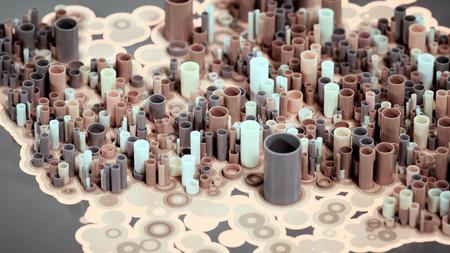
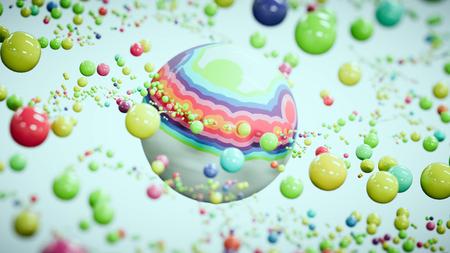
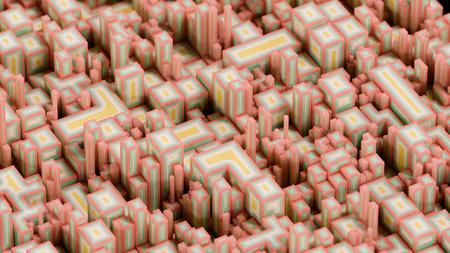
Global light sampling:A new, more efficient sampling technique for lights is available. Enable global light sampling in the Advanced section of the Arnold Render Settings. When enabled, the light sample settings on individual lights are ignored and the overall, global contribution of all lights together is computed using the specified number of samples only. In this release, global light sampling does not apply to environment, directional lights, volumes, and GPU rendering. (ARNOLD-12860)
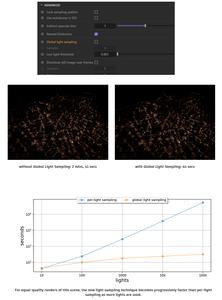
Shape instance distribution:A new control is added to the Arnold Scatter object and Arnold Tag of particle systems, which allows you to control the amount of each shape instance when instancing with multiple shapes in random and blend modes. The knots of the widget define the distribution of shapes in order. For instance the first knot at 50% means that 50% of the instances will be shape 1 instances. The second knot at 80% means that 30% of the instances will be shape 2 instances. The remaining 20% will be shape 3 instances. (C4DTOA-2895)
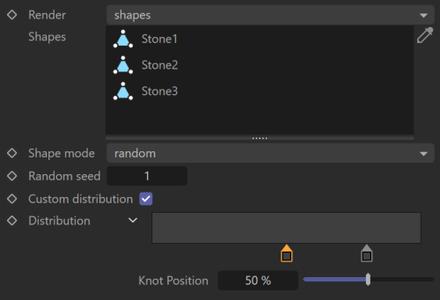
Random shape instance and radius variation based on particle ID:When instancing particles, random shape instances and random radius variation are now generated from the particle ID instead of the order index, where exists (X-Particles, Thinking Particles). This means particles preserve the same shape and size in all frames, even if particles born and die. (C4DTOA-2911)
Material preview view transform:Arnold material previews (legacy material and Node Material) are now displayed with the selected view transform applied. In case of an Arnold color manager, the view transform can be set in the Arnold Render Settings. If the Cinema 4D color manager is used, view transform can be set in the Project Settings. (C4DTOA-2904)
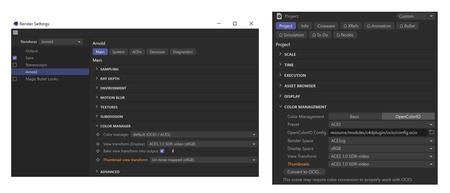
Improved Node Material viewport preview performance:The Arnold Node Material viewport preview scene is optimized to render faster. Textures are now rendered in the viewport only when necessary. (C4DTOA-2833)
Note: A bug in Cinema 4D 2023.1 prevents optimized viewport texture renders. Textures are always re-rendered on any changes in the graph.
Background visible in transmission:New options in the Arnold tag of the Background Object to make the background image visible in transmission. When Render As Object is enabled, the background image is assigned to a plane facing the camera and IOR takes effect. (C4DTOA-2929)
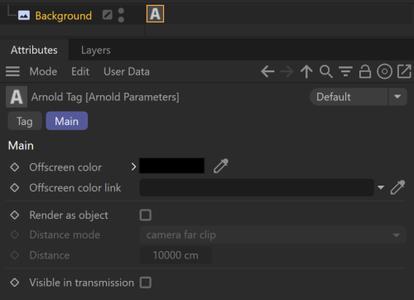
Disable sky in physical_sky:In addition to the preexisting enable_sun parameter, the physical_sky shader now also has an enable_sky parameter for disabling the sky. This allows, for instance, to have two suns. (ARNOLD-12584)
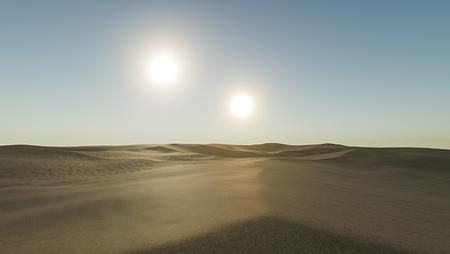
Colorspace included in TX filename:AutoTX-generated files now include the original extension and the texture and rendering color spaces in the filename. For example, running AutoTX on my_texture.jpg with an sRGB color space and ACEScg rendering color space will produce: my_texture_sRGB_ACEScg.jpg.tx. Textures that are not supposed to have colorspace changes get the tag raw, such as my_texture_raw.jpg.tx. (ARNOLD-11919)
New tx filename supported in the Tx Manager:When you generate tx files using the default auto tx options, the TX Manager now includes the image and render color spaces in the filename. (C4DTOA-2907)
Individual lights in the light mixer:The Add Layer menu in the light mixer now lists all lights from the scene that are not assigned to any light groups. Selected lights are added to the mixer. Clicking on all in the menu adds all light groups and all individual lights to the mixer. (C4DTOA-2892)
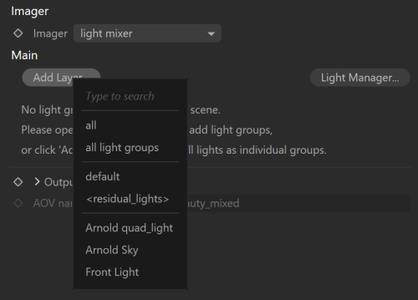
Create light groups of individual lights in the Light Manager:Lights not assigned to any light groups can be moved to their dedicated groups with the new Create Default Groups button in the Arnold Light Manager. These lights can then be tuned in the light mixer imager. (C4DTOA-2892)
Instancer procedural:Arnold Scatter object, particle instances and multi-instances are now using the Arnold instancer procedural node instead of creating ginstances directly. This change has no immediate effect on performance, but makes introducing optimizations in future releases simpler. (C4DTOA-2105)
Optimize nodes command in the legacy node editor:New command is added to the legacy node editor (Edit > Optimize Nodes, shortcut: Alt + W ~ O), which sets each node displayed in the editor to its optimal size. (C4DTOA-2940)
Blend opacity default value in the Arnold Object Mask tag:Blend opacity is now turned off by default in the object mask tag. (C4DTOA-2943)
Updated Python API:New functions for checking if a material is an Arnold material (either legacy or node based), a legacy Arnold material, or a node-based Arnold material. (C4DTOA-2923)
Improved triangle intersector:Triangle intersection is now 20% faster and less likely to allow rays to incorrectly slip between triangles, which manifested as holes in a mesh. (ARNOLD-4136)
Faster loading of OpenVDB volumes in Windows:In Windows, OpenVDB volumes are faster to load, especially on certain many-core CPUs. On one 112-core machine we've seen 4.5x faster loads; other CPUs saw smaller speedups. (ARNOLD-12633)
Faster instancer initialization:The instancer procedural is now faster on single-socket CPUs. We've seen up to 1.6x faster node initialization on some machines. (ARNOLD-12963)
alembic.objectpath changed to an array :The alembic procedural parameter objectpath is now an ARRAY type, so multiple object paths can be given to a single alembic procedural. (ARNOLD-12950)
uv_transform improvements :The uv_transform shader now has a wset parameter, which is the name of a float user data value. A new matrix attribute uvw_matrix returns new coordinates based on the uvw values. If the new attribute uvcoords is linked to a shader, the values returned by that shader override the uv coordinates, at the cost of efficiency because this prevents Arnold from using the correct filtering. (ARNOLD-13049, ARNOLD-13156)
Update OSL :Open Shading Language (OSL) has been updated to version 1.12.9. (ARNOLD-11791)
Update Boost:The Boost library has been updated to 1.81.0. (ARNOLD-12271)
Update zlib:The zlib library has been updated to 1.2.13. (ARNOLD-13097)
Update Cryptomatte:Cryptomatte has been updated to 1.2.2. (ARNOLD-13101), so sidecar manifests now work with Solaris.
autotx metadata in tx files:TX files generated with AutoTX now have the metadata autotx 1 added to the TX file. (ARNOLD-13025)
New environment variable for external control of autotx:The new environment variable ARNOLD_AUTO_GENERATE_TX overrides the options parameter texture_auto_generate_tx. This environment variable can be either never or when_outdated, which are equivalent to disabling or enabling the global autotx option. (ARNOLD-12875)
Faster node init/update:The node init and update times are now faster. We have seen speedups of up to 20%. (ARNOLD-12870)
Improved many-core volume scaling:Rendering performance of volumes has been improved on certain many-core machines. The Disney cloud on a dual socket Intel Xeon Linux machine (56 total logical cores) now renders 1.4x faster. (ARNOLD-13004)
Improved many-core OCIO performance:Rendering performance when using OCIO has been improved. Examples where this speedup might be observed are when using 8-bit textures, textures in a different colorspace to the rendering colorspace, when not using AutoTX, or shading operations that require colorspace transforms. We have seen up to 20% reduction in rendering time on multi-socket systems. (ARNOLD-12912)
Support up to 1024 CPU cores:AI_MAX_THREADS has been increased from 256 to 1024, which allows Arnold to now create up to 1024 threads for full CPU utilization on machines with up to 1024 cores. (ARNOLD-11015, ARNOLD-12967, ARNOLD-12997)
Better autobump visibility masking:We can now also disable autobump on camera and shadow rays. These used to be treated as always enabled. For scenes with non-opaque objects, disabling autobump on shadow rays can give up to a 50% speed up if there are many non-opaque objects. This shadow ray optimization should only affect the look when autobump is used to adjust the opacity for shadow ray, which likely is not a common use case. (ARNOLD-8863)
Instancer light linking:If a light is linked to a shape and both are instanced, then the instancer now preserves this link within instances. This means the first light instance is linked to the first shape instance, the second light instance to the second shape instance and so on. (ARNOLD-12929)
polymesh.smoothing defaults to true:The default setting for polymesh.smoothing (smoothed normals) is now true across the core and plugins. Previously it was disabled in the core and only some plugins. (ARNOLD-11688)
Upgraded OCIO:OpenColorIO has been upgraded to 2.2.1. (ARNOLD-12743)
Remove warning about using tiled with deep_exr:We no longer warn about using tiled with deep_exr. (ARNOLD-12887)
Update Arnold-USD:USD has been updated to 22.11 (ARNOLD-13075, ARNOLD-13099)
Convert cube, sphere, cylinder, capsule primitives as meshes in the procedural.Geometric primitives are now converted to Hydra meshes instead of Arnold primitives. usd#1318 usd#1451
Support render delegate products for all Arnold drivers.When rendering using Hydra, with husk for example, the render delegate now uses the RenderProduct drivers. usd#1422
Arnold Render Products in Hydra:Setting the render product type to "arnold" (instead of the default "raster") will now render the scene with Arnold drivers. This means we support the driver parameters defined in the Arnold tab of the render products. usd#1423
Instanced skinned meshes:Skinned instances are now rendering in the correct transform and order. usd#1412
fStop and aperture_size:The procedural and render delegate now support both the fStop and the aperture_size parameters in the camera. usd#1421 Support combination of half and full precision AOVs in the procedural. The procedural can now render a combination of half- and full- precision aovs. usd#1416
Always read RenderVar aov:name as an output layer. The RenderVar parameter driver:parameters:aov:name is now used as the output aov layer name. usd#1408
Support Render Product names:Render Product names are now used as the Arnold output layer names. In exr files, each layer name can now be customized. usd#1408
Support asset attributes for filenames when no tokens are present."filename" Arnold attributes are now SdfAssetPaths in USD usd#1163
Filename attributes as Assets:In Arnold shaders (like the image shader), the filename is now an asset parameter. This allows Arnold to support relative paths in a more consistent way for USD. usd#1418
MaterialX displacement shaders:MaterialX displacement shaders are now interpreted correctly. usd#1366
Arnold shader metadаta:We now register all Arnold shader metadata in the Sdr registry. Before only the Help and Role metadata were passed to the registry. usd#1390
AutoTX environment variable:HDARNOLD_auto_generate_tx can be set to override the default AutoTX behaviour in the render delegate. usd#1353
Driver options in the RenderProduct primitive:It is now possible to set the driver options in the RenderProduct primitive using attribute names prefixed with the driver name in the Arnold namespace. For example arnold:driver_jpeg:quality will set the quality when rendering with the jpeg driver. usd#1346
Enable/disable crash handler for the session:The new function AiSetSystemHandlers() and the environment variable ARNOLD_SYSTEM_HANDLER_MASK have been added, allowing a user to mask Arnold built-in system handlers. The supported masks are listed in AtSystemHandlerMask and currently allow all handlers to be either fully enabled or disabled. (ARNOLD-13014)
Check if TX file is up to date:The new function AiTextureTxFileNeedsUpdate() returns true if the TX file needs to be regenerated from its source texture. This can happen if the source texture was modified or if Arnold was updated with a newer OpenImageIO library. (ARNOLD-12994)
Get original texture name for TX file:The new function AiTextureGetTxSourceFileName() returns the name of the texture file used to generate a given TX file. (ARNOLD-13047)
Load/Read, Write, and Resize image API changes:The Image API functions introduced in 7.1.4 now also take an optional AtParamValueMap so that in the future we can add or change parameters to these functions without breaking the API. Currently there are no parameters these functions expect. Additionally, AiLoadImage() has been deprecated and replaced with the more appropriately named AiReadImage(); functionally they do the same thing. (ARNOLD-12937)
bool AiReadImage(const char* filename, const uint8_t format, AtImage& image, AtParamValueMap* params = nullptr);
bool AiWriteImage(const char* filename, const AtImage& image, AtParamValueMap* params = nullptr);
bool AiResizeImage(const AtImage& inImage, AtImage& outImage, AtParamValueMap* params = nullptr);
Specify connected inputs in AiMaterialxGetOslShaderCode:The new optional connected_input parameter enables client code to specify input connection on a MaterialX node reference. This is needed for Geometry Property input connections like UV coordinates, to prevent them from being removed from the generated OSL code. (ARNOLD-12712)
New API to get the name of the TX file generated for a given texture:TX file names now include the color spaces and the extension of the original file, so we added AiTextureGetTxFileName to allow client code to get the exact name of the generated TX file. (ARNOLD-12970)
AtString AiTextureGetTxFileName(const char* filename, AtString texture_color_space, AtString render_color_space, const AtUniverse* universe);
Random shape instance and radius variation based on particle ID:The changes to generating random shape instances and radius variation result in rendering particles as different shapes and with different size as in previous versions. (C4DTOA-2911)
Auto Generate TX and OpenImageIO versioning:Arnold now regenerates tx files only if the OIIO version in Arnold is newer. Using an older Arnold with an older OIIO does not force a regeneration of the tx files. (ARNOLD-12992)
Auto Generate TX on write-protected folder:When a TX file cannot be generated because the target folder is write protected, the TX file is generated in the system temp folder. (ARNOLD-13039)
Minimum driver requirement raised:The minimum supported Nvidia driver versions are now 512.78 (for Windows) and 510.73.05 (for Linux). (ARNOLD-13169)
This version breaks binary compatibility:Shaders, procedurals, and other plugins compiled against older versions of Arnold are not compatible with this version of Arnold and need to be updated and recompiled.
Autodesk Network Licensing version :Arnold 7.2 switches to ARNOL_2024 licensing. (ARNOLD-12833)
Single-user subscriptions will work with Arnold 7.2. The plugin installers automatically register the new version. If you do not use a plugin, then after you download Arnold, open the Arnold License Manager and click Register.
Existing network licenses will not work with Arnold 7.2. Log on to your Autodesk account to generate your new ARNOL_2024 licenses.
Autodesk Network License Manager (NLM) servers must be updated to version 11.18.
AiLoadImage:AiLoadImage() has been deprecated and replaced with the more appropriately named AiReadImage(); functionally they do the same thing. (ARNOLD-12937)
inline AI_DEPRECATED bool AiLoadImage(const char* filename, const uint8_t format, AtImage& image)
{
return AiReadImage(filename, format, image, nullptr);
}
Removed deprecated functions:The following previously deprecated functions have now been removed. (ARNOLD-12938)
// replace with init() as there is no benefit to specifying an init bound
void AtBBox::init(float bound);
// replace with AtMutex
void AiCritSecInit(AtCritSec* cs);
void AiCritSecInitRecursive(AtCritSec* cs);
void AiCritSecClose(AtCritSec* cs);
void AiCritSecEnter(AtCritSec* cs);
void AiCritSecLeave(AtCritSec* cs);
// Replace with variants that specify the universe or render session
int AiDeviceSelect(AtDeviceType device_type, const AtArray* device_ids);
int AiDeviceAutoSelect();
AtDeviceType AiDeviceGetSelectedType();
const AtArray* AiDeviceGetSelectedIds(AtDeviceType device_type);
int AiASSWrite(const char* filename, int mask = AI_NODE_ALL, bool open_procs = false, bool binary = true);
int AiASSWriteWithMetadata(const char* filename, int mask = AI_NODE_ALL, bool open_procs = false, bool binary = true, const AtMetadataStore* mds = NULL);
int AiASSLoad(const char* filename, int mask = AI_NODE_ALL);
void AiMsgSetLogFileFlags(int flags);
void AiMsgSetConsoleFlags(int flags);
int AiMsgGetLogFileFlags();
int AiMsgGetConsoleFlags();
AtNode* AiNode (const AtString nentry_name, const AtString name = AtString(), const AtNode* parent = NULL);
AtNode* AiNodeLookUpByName (const AtString name, const AtNode* parent = NULL);
AtNode* AiNode (const char* nentry_name, const char* name = "", const AtNode* parent = NULL);
AtNode* AiNodeLookUpByName (const char* name, const AtNode* parent = NULL);
bool AiOpSetTarget(AtNode* node);
AtNode* AiOpGetTarget();
AtSessionMode AiGetSessionMode();
void AiRenderAddInteractiveOutput(uint32_t output_index);
bool AiRenderIsInteractiveOutput(uint32_t output_index);
bool AiRenderRemoveInteractiveOutput(uint32_t output_index);
void AiRenderRemoveAllInteractiveOutputs();
void AiRenderSetInteractiveOutput(uint32_t output_index);
uint32_t AiRenderGetInteractiveOutput();
bool AiRenderSetHintBool(AtString hint, bool value);
bool AiRenderSetHintInt(AtString hint, int32_t value);
bool AiRenderSetHintFlt(AtString hint, float value);
bool AiRenderSetHintStr(AtString hint, AtString value);
bool AiRenderSetHintArray(AtString hint, AtArray *value);
bool AiRenderGetHintBool(AtString hint, bool& value);
bool AiRenderGetHintInt(AtString hint, int32_t& value);
bool AiRenderGetHintFlt(AtString hint, float& value);
bool AiRenderGetHintStr(AtString hint, AtString& value);
bool AiRenderGetHintArray(AtString hint, const AtArray*& value);
AtRenderErrorCode AiRender(AtRenderMode mode = AI_RENDER_MODE_CAMERA);
AtRenderErrorCode AiRenderBegin(AtRenderMode mode = AI_RENDER_MODE_CAMERA, AtRenderUpdateCallback update_callback = NULL, void* callback_private_data = NULL);
AtRenderErrorCode AiRenderEnd();
AtRenderStatus AiRenderGetStatus();
void AiRenderInterrupt(AtBlockingCall blocking = AI_NON_BLOCKING);
void AiRenderAbort(AtBlockingCall blocking = AI_NON_BLOCKING);
void AiRenderResume();
void AiRenderRestart();
bool AiRendering();
bool AiUniverseIsActive();
bool AiUniverseCacheFlush(int cache_flags);
AtNode* AiUniverseGetOptions();
AtNode* AiUniverseGetCamera();
AtBBox AiUniverseGetSceneBounds();
AtNodeIterator* AiUniverseGetNodeIterator(unsigned int node_mask);
AtAOVIterator* AiUniverseGetAOVIterator();
Removed min_optix_denoiser_sample option:Removed the deprecated and redundant min_optix_denoiser_sample option. (ARNOLD-11714)
Removed non-functioning kick -of flag:kick -of was removed because it was never able to actually change the output file type. The one thing it could properly do was to output the output file types Arnold can write to, however that functionality can already be reproduced through kick -nodes | grep driver_. (ARNOLD-12857)
Better autobump visibility masking:Camera ray visibility must now be explicitly set (before, camera ray visibility was enabled regardless of the autobump_visibility setting). Existing scenes that use autobump_visibility may need to enable camera ray visibility. (ARNOLD-8863)
License Manager log folder changed on Linux:License Manager application and diagnostic logs are now stored under the ~/.autodesk folder on Linux. (ARNOLD-12993)
kick -nostdin replaced with -stdin:kick no longer automatically reads from stdin, because in the past, waiting for input from stdin caused problems with some tools. If you want kick to read from stdin, use the new -stdin flag. (ARNOLD-6908)
C4DTOA-2896 - Tx Manager shows error if UDIM set does not start with 1001
C4DTOA-2898 - Wrong Arnold Scatter and particle instance transform when the object is rotated
C4DTOA-2903 - Vertex Map shader displays an unused Color Space attribute in Cinema 4D 2023
C4DTOA-2913 - Image sequence is not converted to tx in the Tx Manager if Animation is enabled in the image shader
C4DTOA-2914 - Tx update status check in the Tx Manager sometimes fails for image sequences
C4DTOA-2954 - Scatter object is not lit when included by light
C4DTOA-2956 - Incorrect matrix parameter default value in Node Materials
C4DTOA-2957 - Animated textures do not render if motion blur is enabled
C4DTOA-2960 - Crash when rendering an empty spline
C4DTOA-2853 - Wrong OCIO view transform in Cinema 4D 2023.2 Commandline render
C4DTOA-2881 - Wrong Pyro velocity scale in Cinema 4D 2023.2
ARNOLD-12964 - Rare crash when threads are creating AtStrings at the same time
ARNOLD-12995 - Support nodes from the MaterialX PBR library in USD
ARNOLD-13032 - AiTextureAutoTxFlags not resolving auto color space
ARNOLD-13074 - AiMaterialxGetOslShaderCode fails on ND_separate3_color3
ARNOLD-13073 - AiMaterialxGetOslShaderCode fails on ND_switch_color3
ARNOLD-13115 - Use textures in texture_auto_tx_path even when autotx generation is disabled
ARNOLD-13163 - CPU memory leak when rendering multiple frames on the GPU
ARNOLD-13197 - Log callbacks ignore maximum number of warnings
ARNOLD-13201 - Crashes when default universe is null
ARNOLD-13350 - Set AtNode LocalData pointer to null after node_finish is called
ARNOLD-12712 - Modifying texcoords in USD doesn't work with Arnold
ARNOLD-12982 - [LicenseManager] Support tool fails to install on Linux and macOS when running Diagnostics
usd#1412 - Fix instance skinned mesh in incorrect position and order.
usd#1438 - Creating surface models from PBR nodes doesn't work
usd#1433 - Material binding not handling correctly the different scopes
usd#1447 - MaterialX Triplanar renders black
usd#1427 - Motion blur differences between procedural and delegate
usd#1442 - Velocity motion blur doesn't work if PointInstancer has more than one prototype
usd#1354 - Vertex mismatch with velocity blur and point normals in Hydra
usd#1420 - Unify fStop and aperture_size
usd#1430 - deepexr driver parameters like depth_tolerance are ignored
usd#1411 - append parameter (for checkpointing renders) is not translated
usd#1413 - Crash in UsdSkel in the procedural
usd#1352 - Skinned instances in wrong world position
usd#1394 - USD procedural renders characters in the wrong positions and order
usd#1443 - Incorrect number of motion keys with skinned primvar normals and motion blur
usd#1383 - Relative search paths with UDIM and attribute tags are now correctly passed to Arnold
usd#1380 - Crash when updating a MaterialX shader in Solaris
usd#1372 - Primitives with an empty purpose attribute are now handled correctly
usd#1334 - Skip curves with empty radius
Arnoldis an advanced cross-platform rendering library, or API, developed by Solid Angle and used by a number of prominent organizations in film, television and animation, including Sony Pictures Imageworks. It was developed as a photo-realistic, physically-based ray tracing alternative to traditional scanline based rendering software for CG animation. Arnold uses cutting-edge algorithms that make the most effective use of your computer's hardware resources: memory, disk space, multiple processor cores, and SIMD/SSE units. The Arnold architecture was designed to easily adapt to existing pipelines. It is built on top of a pluggable node system; users can extend and customize the system by writing new shaders, cameras, filters and output driver nodes, as well as procedural geometry, custom ray types and user-defined geometric data. The primary goal of the Arnold architecture is to provide a complete solution as a primary renderer for animation and visual effects.
Arnold for Cinema4D (C4DtoA)supports most Cinema 4D features such as instances, cloners, deformers, generators, MoGraph geometry, hair, and ThinkingParticles. It also supports both animation and single frame distributed rendering in Team Render, allowing the use of all computers in a local network to speed-up Arnold rendering. Third-party plugins TurbulenceFD and X-Particles are natively supported, allowing artists to render high quality smoke, fire, and particle effects with fully interactive feedback. Other features include volume rendering with OpenVDB, a node-based material editor and a comprehensive list of shaders and utilities, including vertex maps and per-face materials.
The Ultimate Introduction to Arnold 6 (& 7) For Cinema 4d
Solid Angle SLis the technology company behind the Arnold rendering software, with offices in Madrid and London and customers throughout the world including Framestore, DreamWorks, ILM, Sony Pictures Imageworks, MPC, The Mill, Mikros Image and Rising Sun Pictures. Arnold was designed from the ground up to efficiently raytrace the complex geometric datasets required for feature-length CGI animation and big budget visual effects, while at the same time simplifying the pipeline, reducing the number of passes, minimizing storage requirements and greatly enhancing interactivity for lighting artists.
Buy Premium From My Links To Get Resumable Support,Max Speed & Support Me
Rapidgator-->Click Link PeepLink Below Here Contains Rapidgator
http://peeplink.in/28b9555b75b6
yruln.setup.part1.rar.html
yruln.setup.part2.rar.html
yruln.setup.part3.rar.html
Uploadgig--> Click Link PeepLink Below Here Contains Uploadgig
http://peeplink.in/28b9555b75b6
yruln.setup.part1.rar
yruln.setup.part2.rar
yruln.setup.part3.rar
NitroFlare-->Click Link PeepLink Below Here Contains Nitroflare
http://peeplink.in/28b9555b75b6
yruln.setup.part1.rar
yruln.setup.part2.rar
yruln.setup.part3.rar
Links are Interchangeable - Single Extraction
Free Download Solid Angle Cinema 4D to Arnold 4.6.1 (x64) is known for its high-speed downloads. It uses multiple file hosting services such as Rapidgator.net, Nitroflare.com, Uploadgig.com, and Mediafire.com to host its files